SUBJECTS
GRADE
Show Results
Talent Contest: Acting Out Adverbs

Lesson Summary
- With a host and four contestants, act out a talent contest.
- Perform three different talents, based on chosen adverbs.
Lesson Plan and Procedure
Lesson Key Facts
- Grade(s): 3, 4, 5
- Subject(s): Drama, English Language Arts
- Duration of lesson: 55 minutes
- Author(s): Haley Flanders Anderson
Note: It helps if you have already introduced the concept of verbs and adverbs that end in -ly prior to this activity. A quick refresher on adjectives is also suggested.
Warm-Up/Hook
Teacher: We are going to play “Adverb Charades.” I am going to call up three students, and they will act out the exact same verb but use different adverbs. Who can remind the class what an adverb is? An adverb answers the questions how, where, or when, or gives a condition or reason. The adverb tells us how the verb is to be acted out. Adverbs make the difference between singing wonderfully, loudly, quietly, or terribly. You will all know the verbs, but only the three actors will know the adverbs. They will each act one at a time. Then you can raise your hand if you want to guess one of the adverbs. All of the adverbs in this game will end in -ly.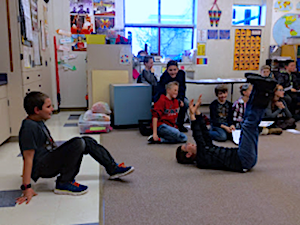
Name the verb to the class, and choose three students. To each of the three students, whisper one adverb or give a card with an adverb written on it. Have them take turns acting out the verb with the adverb, pantomiming or using nearby props if needed. They can use volume; they do not need to be silent. Take guesses from the class until each adverb has been correctly identified. Make sure all three actors perform before you take guesses from the class. Complete this activity again with three new students, a new verb, and three new adverbs. To make it more challenging, have the class guess the verb as well.
- Some recommended action verbs: devour, squeeze, jump, sing, jump rope, bowl, dig, fly, sneeze, yawn, stretch, talk, wash, wave, walk, scrub, swim, enter (the room), paint
- Some recommended adverbs: quickly, slowly, loudly, softly, nervously, confidently, poorly, perfectly, awkwardly, scarily, sadly, kindly, miserably, gracefully, sloppily, arrogantly, sleepily, intensely, badly, calmly, defiantly, enthusiastically, hastily, happily, silently, viciously, secretively, carefully, bashfully, daringly
Teacher: Actors, was this easy or hard for you to act out? Why was it easy or hard? Students, was it easy or hard to guess the adverbs? Why was it easy or hard? Just like this game, our activity today will have you acting out awesome action verbs by participating in a talent contest!
Introduction
Teacher: You are going work in groups of five. One of you will be the host, and the remaining four students will be the contestants. Together, you will decide on three talents to perform. You will pantomime the talents, meaning you will not use props. Every contestant performs all three talents, but each uses a different adverb to guide each talent. You can reuse adverbs, but I encourage you to use 12 different adverbs. Finally, the host will announce fourth, third, second, and first place.
Show the students the worksheet and the list of possible talents and adverbs, as well as the host script. Copy the worksheet and possible talents and adverbs back to back.
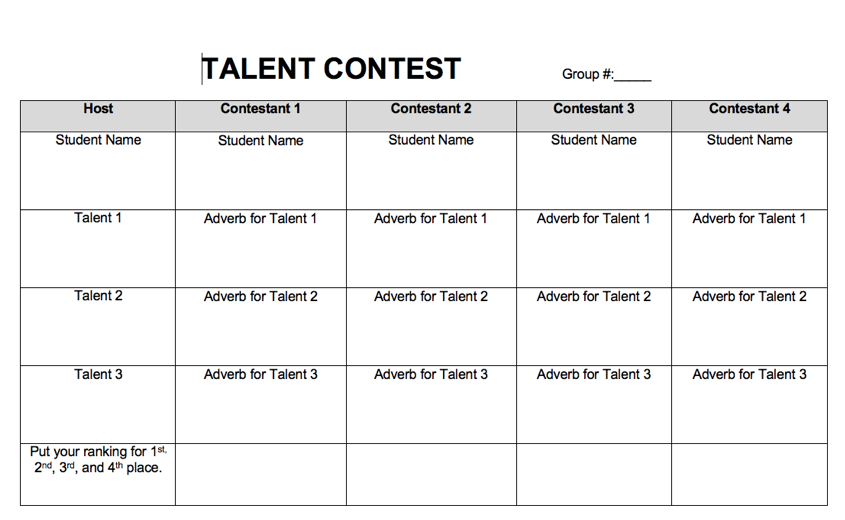
Teacher: Fill out the worksheet to include your names, talents, adverbs, and rankings. On the back of the chart is a list of possible talents and adverbs and a script for the host. You may choose talents or adverbs that are not on the list, but I must approve them first. When everyone is ready, we will perform for each other. Host, decide on an adjective for your talent contest, and write it in your script. Adjectives are words that describe, like amazing, crazy, and delightful. Here is the host’s script:
“Welcome to the (adjective) talent contest! I am your host, (name). Contestant #1 is (name), contestant #2 is (name), contestant #3 is (name), and contestant #4 is (name).
“Our first (adjective) talent today is (talent). Contestant #1 has chosen to perform it (adverb). You may begin. Contestant #2 has chosen to perform it (adverb). You may begin. Contestant #3 has chosen to perform it (adverb). You may begin. Contestant #4 has chosen to perform it (adverb). You may begin.”
(This section repeats for talents #2 and #3. Then the script reads the following.) “Now for our winners! Fourth place is (name), third place is (name), second place is (name), and first place is (name). Congratulations! Thank you, contestants. And thank you, audience, for coming today! We hope you enjoyed it!”
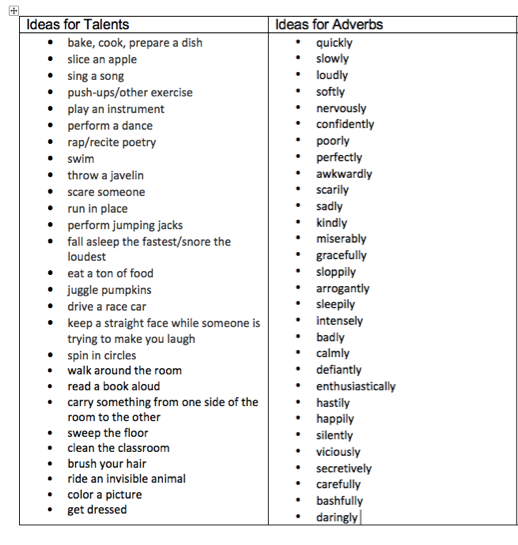
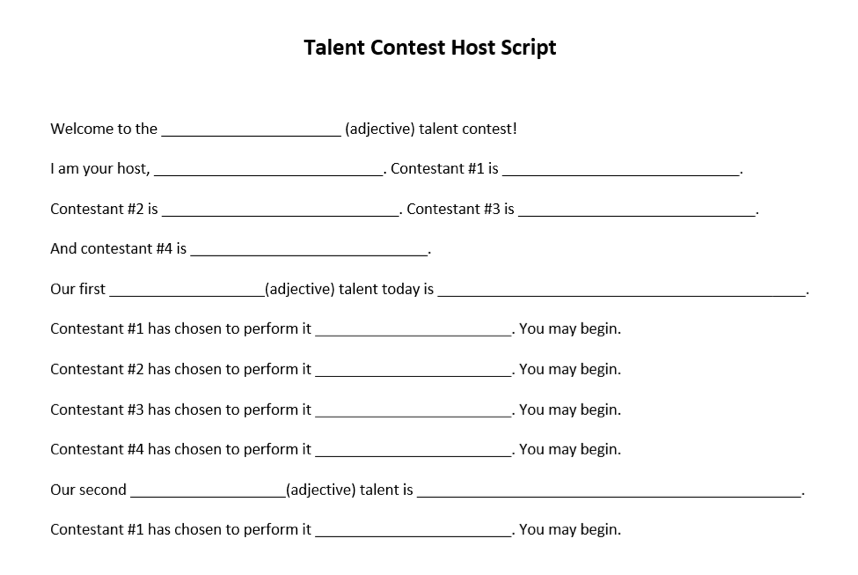
Instruction/Rehearsal 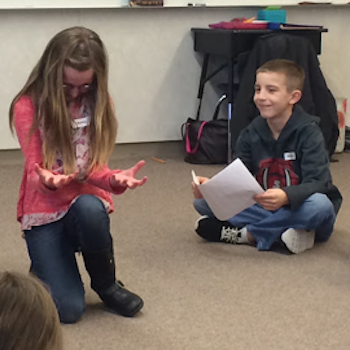
Split the class into groups of five. If needed, make a group of four (a host and three contestants). Give one worksheet to each group, and give them 10 minutes to fill it out and rehearse. This activity takes much longer to perform than to plan, so keep the rehearsal time short.
Teacher: You will have 10 minutes. As you write and rehearse, consider how to animate your voice and body to bring these adverbs to life. Choose challenging talents and adverbs, and establish character traits that make each contestant unique. Remember, even the host is a performer. Get creative and have fun!
Review and approve the chosen talents and adverbs for each group. If a talent is a race, instruct the students to modify the script so the contestants perform simultaneously and finish one at a time. Otherwise, all talents are performed by one person at a time. If the students want to use pretend character names, they must write their real names in parentheses.
Activity/Performance
 Invite the class to gather together and perform their talent contests. It is best to number the groups on the worksheet and have them perform in that order. Allow hosts to use a pencil or another writing utensil as a microphone. Encourage them to use the entire room if needed.
Invite the class to gather together and perform their talent contests. It is best to number the groups on the worksheet and have them perform in that order. Allow hosts to use a pencil or another writing utensil as a microphone. Encourage them to use the entire room if needed.
Performance challenges: To make performances more difficult, you can instruct the host to name the adverbs per talent and have the class guess which adverb belongs to which contestant performance. The host can also omit saying the adverbs altogether and have the class guess, like in the warm-up.
Conclusion
Teacher: What was fun about this activity? What was challenging? Why? What adverbs or talents did you particularly like from another group? How did this activity demonstrate the power and role of adverbs in grammar? What would this talent contest be like if the English language did not have adverbs? How did the adverbs make the contest and characters unique?
Learning Objectives
- Demonstrate command of grammatical conventions when writing and speaking.
- Establish a situation and characters who respond to actions.
- Use descriptions and concrete words.
- Develop imagination.
- Define roles and work in a group.
- Communicate character and story through physicality.
- Demonstrate audience skills.
Utah State Board of Education Standards
This lesson can be used to meet standards in many grades and subject areas. We will highlight one grade’s standards to give an example of application.
Grade 4 English Language Arts
Standard 4.W.3: Write narrative pieces to develop real or imagined experiences or events using effective technique, descriptive details, clear event sequences, and provide a resolution.
- Orient the reader by establishing a situation and introducing a narrator and/or characters; organize an event sequence that unfolds naturally.
- Use dialogue and description to develop experiences and events or show the responses of characters to situations.
- Use a variety of transitional words and phrases to manage the sequence of events.
- Use concrete words, phrases, complex sentences, and sensory details to convey experiences and events precisely.
- Use appropriate conventions when writing including text cohesion, sentence structure, and phrasing.
Grade 4 Drama
Standard 4.T.CR.1: Develop imagination to create artistic ideas and work.
Standard 4.T.CR.4: Define roles, identify responsibilities, and participate in group decision making.
Standard 4.T.CR.5: Create character through imagination, physical movement, gesture, sound and/or speech and facial expression.
Standard 4.T.CR.7: Recognize that participating in the rehearsal process is necessary to refine and revise.
Standard 4.T.P.3: Observe, listen, and respond in character to other actors throughout a scripted or improvised scene.
Standard 4.T.P.4: Communicate meaning using the body through space, shape, energy and gesture.
Standard 4.T.R.1: Demonstrate audience skills of observing attentively and responding appropriately.
Equipment and Materials Needed
- Pencils
- PDF “Talent Contest,” the host’s script and the list of talents and adverbs (one per group)
Additional Resources
- This is another lesson plan for “Adverb Charades”: https://www.educationworld.com/a_lesson/04/lp334-02.shtml
- Following are links to action verbs for the charades warm-up:
- This website has many lists of adverbs (recommended section: “List of Common Adverbs,” listed alphabetically in columns): https://kidspicturedictionary.com/word-must-know/adverbs/list-of-common-adverbs/
Image References
Image 1: https://www.shutterstock.com/image-photo/group-children-enjoying-drama-class-together-268254818
Images 2–7: Haley Flanders Anderson.

www.education.byu.edu/arts/lessons
 Download
Download